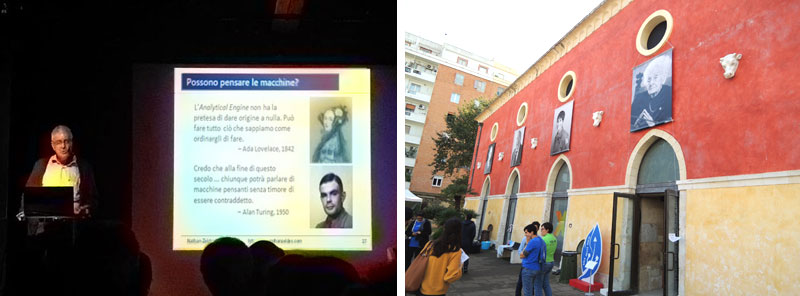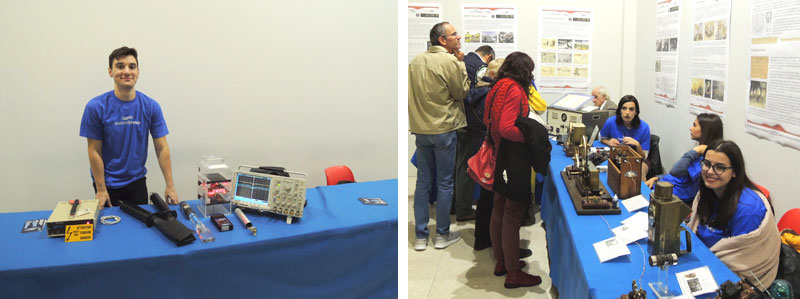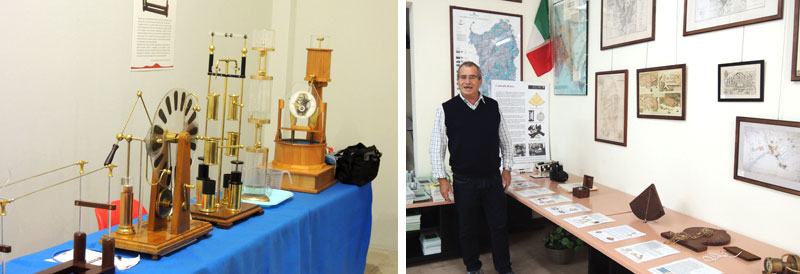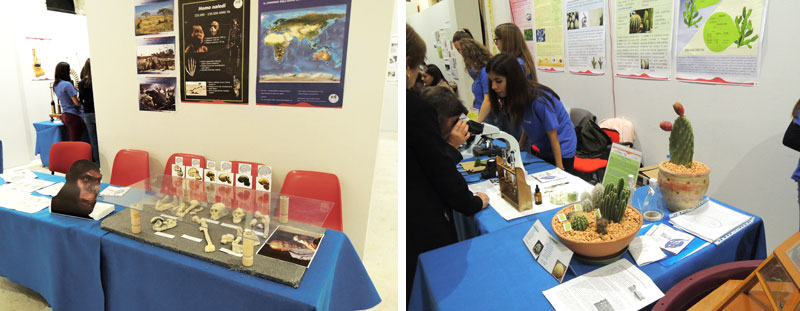Just returned from a wonderful trip to Sardinia, Italy, where I saw some cool things related to the dissemination of science education, so I thought I’d share.
I was invited by FestivalScienza Cagliari to deliver a lecture about Alan Turing and the future of AI – in Italian, mind you – which was a challenge not to be refused. This I did successfully, drawing a lively interaction with the audience and a subsequent interview in the TV news journal – evidently the lecture made everybody think, as well it should, given where AI is headed. But while I was there I saw how the entire festival was organized, and I liked what I saw. Here are some ideas that may deserve emulation in other geographies.

L: Lecturing about Turing R: The EXMA exhibition space
Thinking big
The festival was driven by a the Associazione Scienza Società Scienza, a society dedicated to science dissemination in Sardinia; but it was organized in collaboration with a very long list of academic, educational, governmental and public sector bodies. Getting all of these to cooperate in defining, sponsoring, promoting and participating in the event added invaluable leverage to the common effort.
I was impressed with the scope of this project. It was actually a set of five major events, held in five cities on the island, the main one in Cagliari lasting six days and the others three days each. In Cagliari there were 80 lectures, 20 laboratories, and many exhibits; the turnout was around 14,000 visitors, including school groups, families and individuals, all curious and eager to see and hear about science. And this is the 11th year that the festival is taking place!
In line with this, while the central site for the festival took place at a lovely exhibition and performance space housed in a historical building (originally the city’s 19th century slaughterhouse, still adorned with marble sculptures of cow heads!), there were also activities at a score of affiliated museums, libraries, parks and technological sites all over the city.
What’s more, the organizers have signed a reciprocity agreement with a parallel organization in Corsica, as a first step towards a rotating Mediterranean science festival where many countries will send their students to meet, learn and excel in various competitions. Wayda go!
Empowering teenagers
The thing I liked most was that there were over 300 kids in the role of instructors and presenters at the many exhibition tables. Some were university students, but most were in high school. Working in small teams, they were either presenting and explaining their own science projects, or presenting exhibits brought in by adults.

Pupils presenting a cosmic ray detector (left) and a telegraphy exhibit (right)
And this was a well-planned effort: turns out that the kids were getting school credit for participation – because their schools saw it not just as a science activity, but as a way to practice public interaction and improve presentation skills, something that is sadly often missing in young people at a later age, as I can attest from years of observation. So, the school would select and assign the kids, and the festival would provide the necessary infrastructure and training to enable them to do their job.
This is a really cool way to engage teenagers in science, community, and human interaction, adding to their confidence and self-esteem… and they had great fun as well!
Engaging adults
Although the event was primarily about young attendees, it was interesting to see how it attracted and involved many grown-ups, of all ages. In part this was because the program was interesting, attracting a diverse audience to hear the lectures presented; and in part it was because people with a passion for any aspect of science could contribute to the exhibits.
My friend Nicola Marras presented two exhibits: one about the history of communications that included his amazing telegraph equipment collection, and one about the history of marine navigation equipment. The local radio amateur club brought in some impressive radio communications gear. There was a display of scientific demonstration gear – the kind where you turn a crank and sparks fly – built by a local master builder of such things. The festival made sure citizens possessing such collections, and the knowledge that comes with them, were welcome to add to the show; and the school kids were available to present the materials to the public.

L: Scientific demonstration gear R: Nicola Marras at his navigation exhibit
In summary
What I liked most about the FestivalScienza at Cagliari was the enthusiasm of all involved. The academics who drive the project, the community members supporting it with their knowledge and collections, the students and high school pupils manning the exhibits, and the visiting members of the public of all ages – all of them were full of excitement, energy and passion.
Take the exhibit crafted by a student who had developed a passion for anthropology, to the point where she had created in clay replicas of key fossil finds, then built around them an exhibit with posters and images that she eagerly explained to all comers. Or the group of students who had researched the water retention methods of cactus plants and were demonstrating their findings with potted plants and microscopes.

L: Anthropology exhibit R: Water retention exhibit
This enthusiasm is exactly what I see as the goal of science education, because it is contagious. Science is so exciting once you “get” it… and events like this one enable the “getting”. How wonderful is that?!

